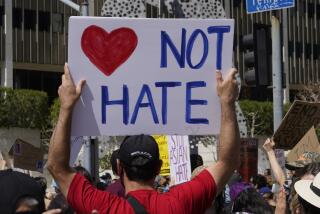Impact of Hate Crimes Recounted at Summit
Maggie Houston remembers the shots that flew over her head minutes after a 13-year-old Latino boy had murdered an 11-year-old African American boy to earn entry into a street gang.
The youth, riding a bike, had spotted Houston, a 48-year-old African American woman, on her doorstep and decided to shoot at her too.
Houston ducked and scrambled into her house to call for help.
The deep emotional scars left behind have just begun to heal. Houston still shakes when she recounts how her life was threatened at the hands of a racially prejudiced teenager in March.
“I was a victim of a hate crime and it did a lot to me,” said Houston, who nearly moved out of her Harbor Gateway neighborhood after the incident in fear of the racial strife that she says permeates her community.
Instead, she decided to fight back.
She is the chairwoman of the Harbor Gateway Steering Committee, which is trying to end the cycle of racially inspired tension in this narrow strip of Los Angeles city land wedged between Carson and Torrance.
Now Houston strides through Latino neighborhoods where no African Americans dared walk before. She stops people to talk about healing the strife.
Houston was one of more than a dozen Los Angeles County residents testifying Wednesday at the first of three hate crime summits organized by a county Human Relations Commission task force. The public forums are the first steps toward defusing a growing number of conflicts in Los Angeles County based on race, religion or sexual orientation.
Wednesday’s summit in Carson looked at the social, economic, demographic and psychological factors that underlie hate crimes. It was organized in response to statistics showing that hate crimes in Los Angeles County rose 25% in 1996 over the previous year.
County law enforcement agencies recorded 995 hate crimes last year, compared with 793 in 1995. That included a 43% increase in sexually oriented hate crimes, a 20% increase in racially motivated crimes and a 9% increase in crimes sparked by religious hatred.
Education was touted as one of the principal weapons for fighting hate crimes.
Carla Arranaga, the deputy district attorney in charge of the county’s hate crimes prosecution unit, believes that the problem has to be tackled by educating students about their differences. “Children are not born to hate,” she said.
However, race and ethnicity are not the only elements that contribute to hate crimes, said Ali Modarres, a demographer and professor of urban geography at Cal State Los Angeles. Because new arrivals tend to be poorer than established groups, class difference was another predictor for community problems.
More to Read
Sign up for Essential California
The most important California stories and recommendations in your inbox every morning.
You may occasionally receive promotional content from the Los Angeles Times.










